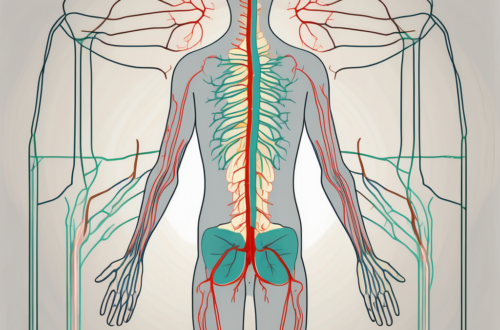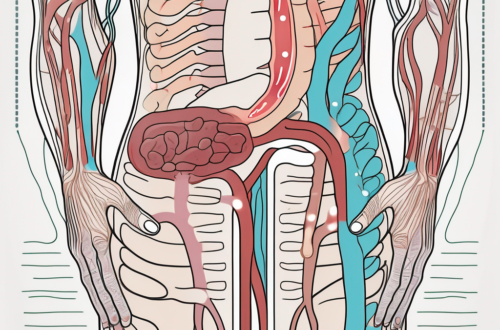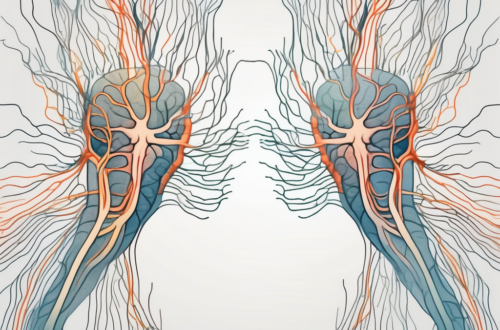The parasympathetic nervous system plays a vital role in the functioning of our body. It is responsible for maintaining homeostasis, promoting rest and relaxation, and conserving energy. Understanding the intricate workings of this system can help us comprehend its impact on various body functions and its potential therapeutic applications. In this article, we will delve into the significance of the main parasympathetic nerve, the vagus nerve, and its role in the body.
Understanding the Parasympathetic Nervous System
Before we explore the specifics of the main parasympathetic nerve, let’s familiarize ourselves with the parasympathetic nervous system as a whole. The parasympathetic nervous system is one of the two divisions of the autonomic nervous system, along with the sympathetic nervous system. While the sympathetic nervous system prepares our body for “fight or flight” responses, the parasympathetic nervous system acts as its counterpart, responsible for promoting relaxation and conserving energy.
The parasympathetic nervous system plays a crucial role in maintaining homeostasis, ensuring that our body functions optimally. It works in harmony with the sympathetic nervous system, creating a delicate balance that allows us to adapt to different situations.
Definition and Basic Functions
The parasympathetic nervous system is often referred to as the “rest and digest” system due to its role in promoting rest, relaxation, and digestion. It helps regulate various bodily functions such as heart rate, digestion, pupil constriction, salivation, and bladder control. In essence, it counters the effects of the sympathetic nervous system, maintaining a delicate balance to ensure optimal functioning of our body.
When activated, the parasympathetic nervous system slows down our heart rate, allowing our body to conserve energy. It stimulates the production of saliva, aiding in the digestion process. Additionally, it constricts our pupils, helping us focus on nearby objects. Furthermore, it promotes bladder control, preventing involuntary urination.
Components of the Parasympathetic Nervous System
The parasympathetic nervous system consists of various nerves and ganglia, but one particular nerve stands out as the main player in this intricate network – the vagus nerve (cranial nerve X). Let’s explore the anatomy and functions of this important nerve in the following section.
The vagus nerve, also known as the wandering nerve, is the longest cranial nerve in our body. It originates in the medulla oblongata, a part of the brainstem, and extends down to various organs in our body, including the heart, lungs, stomach, and intestines. This extensive reach allows the vagus nerve to exert its parasympathetic influence on multiple systems.
The vagus nerve plays a vital role in regulating heart rate and blood pressure. It sends signals to the heart, slowing it down and reducing blood pressure when necessary. This helps maintain a steady and balanced cardiovascular system.
In addition to its cardiovascular functions, the vagus nerve also plays a crucial role in digestion. It stimulates the production of gastric juices, aiding in the breakdown of food in the stomach. It also promotes the contraction of smooth muscles in the gastrointestinal tract, facilitating the movement of food through the intestines.
Furthermore, the vagus nerve is involved in various other functions, such as controlling our breathing rate, regulating sweating, and influencing our emotional state. It forms connections with different areas of the brain, allowing it to communicate and modulate our physiological and psychological responses.
In conclusion, the parasympathetic nervous system, with the vagus nerve as its main component, is responsible for promoting rest, relaxation, and digestion. It counteracts the effects of the sympathetic nervous system, maintaining a delicate balance in our body. Understanding the intricacies of this system helps us appreciate the complexity of our body’s physiological processes.
The Main Parasympathetic Nerve: Vagus Nerve
The vagus nerve, also known as the 10th cranial nerve, is the longest nerve in our body. It is a complex structure that innervates numerous organs, connecting the brain to the rest of the body. Understanding the anatomy and functions of the vagus nerve is essential to comprehend its impact on various body functions.
The vagus nerve, scientifically referred to as cranial nerve X, is a fascinating component of the human nervous system. It derives its name from the Latin word “vagus,” meaning “wandering.” This name perfectly encapsulates the nature of the vagus nerve, as it meanders through the body, reaching out to various organs and tissues.
The anatomy of the vagus nerve is truly remarkable. It originates from the medulla oblongata, a vital part of the brainstem located at the base of the brain. From this point of origin, the vagus nerve descends through the neck, branching out into multiple fibers that extend to different regions of the body. These fibers intricately connect with organs such as the heart, lungs, liver, and digestive tract, forming an intricate network of communication pathways.
As the vagus nerve extends its reach throughout the body, it carries essential signals to and from the brain. These signals enable the brain to communicate with various organs, exerting control over their functions. Without the vagus nerve, the brain would be isolated, unable to regulate and coordinate the intricate processes that keep our bodies functioning optimally.
Anatomy of the Vagus Nerve
The vagus nerve begins in the medulla oblongata, located at the base of the brain. From there, it descends through the neck and branches out into multiple fibers, reaching various organs including the heart, lungs, liver, and digestive tract. These fibers carry important signals to and from the brain, enabling communication and control of bodily functions.
As the vagus nerve extends its reach throughout the body, it forms connections with an array of organs, each with its own unique role in maintaining homeostasis. For example, the vagus nerve connects with the heart, where it acts as a natural pacemaker, regulating the heart rate and ensuring its steady rhythm. Additionally, the vagus nerve influences the bronchial smooth muscles, playing a crucial role in controlling breathing patterns.
The vagus nerve also extends its influence to the digestive system. It stimulates gut motility, ensuring the smooth movement of food through the digestive tract. Furthermore, it promotes the release of digestive enzymes, aiding in the breakdown and absorption of nutrients. Without the vagus nerve’s involvement, the digestive process would be compromised, leading to various gastrointestinal issues.
Functions of the Vagus Nerve
The vagus nerve plays a crucial role in regulating several bodily processes. One of its primary functions is to slow down the heart rate, acting as a natural pacemaker. It achieves this by sending signals to the heart, instructing it to beat at a slower pace. This control over heart rate is essential for maintaining cardiovascular health and preventing conditions such as tachycardia or arrhythmias.
In addition to its role in heart rate regulation, the vagus nerve is involved in controlling bronchial smooth muscles, influencing breathing patterns. By modulating the contraction and relaxation of these muscles, the vagus nerve helps regulate the flow of air in and out of the lungs. This ensures efficient gas exchange and optimal oxygenation of the blood.
Furthermore, the vagus nerve plays a significant role in the digestive system. It stimulates gut motility, ensuring the smooth movement of food through the esophagus, stomach, and intestines. This coordinated movement allows for efficient digestion and absorption of nutrients. Additionally, the vagus nerve promotes the release of digestive enzymes, which break down complex molecules into simpler forms that can be easily absorbed by the body.
Beyond its direct impact on heart rate, breathing patterns, and digestion, the vagus nerve also influences other bodily functions. It is involved in regulating blood pressure, reducing inflammation, and even modulating mood and emotions. The vagus nerve’s far-reaching effects highlight its importance in maintaining overall health and well-being.
The Impact of the Vagus Nerve on Body Functions
Now that we have an understanding of the anatomy and functions of the vagus nerve, let’s explore its impact on specific body functions, such as heart rate, digestion, and more.
The Vagus Nerve and Heart Rate
The vagus nerve plays a vital role in regulating heart rate. Through its parasympathetic connections, it helps slow down the heart rate, promoting a state of relaxation. This is especially evident during deep breathing exercises and meditation techniques, which stimulate the vagus nerve and trigger a relaxation response.
Furthermore, the vagus nerve also influences heart rate variability (HRV), which is the variation in time intervals between consecutive heartbeats. Higher HRV is associated with better cardiovascular health, as it indicates a more flexible and adaptive autonomic nervous system. The vagus nerve, with its intricate network of fibers, contributes significantly to maintaining optimal HRV.
In addition to heart rate regulation, the vagus nerve also has an impact on blood pressure. By modulating the release of neurotransmitters like acetylcholine, it helps maintain blood pressure within a healthy range. Dysfunction of the vagus nerve can lead to conditions such as hypertension, where blood pressure becomes chronically elevated, increasing the risk of cardiovascular diseases.
The Vagus Nerve and Digestion
When it comes to digestion, the vagus nerve is involved in various aspects of the process. It helps stimulate the release of digestive enzymes, as well as increase gut motility, aiding in the breakdown and absorption of nutrients. Dysfunction of the vagus nerve can lead to digestive disorders such as gastroparesis, where the stomach does not empty properly, causing symptoms like nausea and bloating.
Furthermore, the vagus nerve also plays a role in the gut-brain axis, a bidirectional communication system between the gut and the brain. This means that the vagus nerve not only influences digestion but also affects mood and mental health. Research has shown that stimulating the vagus nerve can have antidepressant and anxiolytic effects, providing a potential therapeutic avenue for individuals with mood disorders.
In addition to its impact on digestion and mental health, the vagus nerve also contributes to immune function. It helps regulate inflammation in the body by releasing anti-inflammatory substances and modulating the activity of immune cells. Dysfunction of the vagus nerve can lead to an overactive immune response, resulting in chronic inflammation and increased susceptibility to autoimmune diseases.
Overall, the vagus nerve is a multifaceted and essential component of the autonomic nervous system. Its influence extends beyond heart rate and digestion, encompassing cardiovascular health, blood pressure regulation, mental well-being, and immune function. Understanding the intricate workings of the vagus nerve opens up new possibilities for therapeutic interventions and highlights the interconnectedness of various bodily functions.
Disorders Related to the Vagus Nerve
The vagus nerve, also known as the tenth cranial nerve, plays a crucial role in maintaining optimal bodily functions. It is the longest nerve in the body and connects the brain to various organs, including the heart, lungs, and digestive system. While the vagus nerve is essential for the proper functioning of these organs, certain disorders can affect its normal functioning, leading to a range of symptoms and complications.
Disorders related to the vagus nerve can manifest in various ways, depending on the affected organ system. One common symptom is an irregular heart rate, also known as arrhythmia. This can cause heart palpitations, a sensation of rapid or fluttering heartbeats. Individuals with vagus nerve disorders may also experience difficulty swallowing, a condition known as dysphagia. This can make it challenging to eat and drink, leading to weight loss and malnutrition if left untreated.
Gastrointestinal disturbances are another common symptom of vagus nerve disorders. These disturbances can include bloating, abdominal pain, nausea, vomiting, and changes in bowel movements. The vagus nerve plays a vital role in regulating the digestive system, so any disruption can lead to these uncomfortable and sometimes debilitating symptoms.
In addition to affecting the heart and digestive system, vagus nerve disorders can also impair lung function. The vagus nerve helps regulate the muscles responsible for breathing, so when it is not functioning properly, individuals may experience shortness of breath, difficulty breathing deeply, or decreased lung capacity. These respiratory symptoms can significantly impact an individual’s ability to engage in physical activities and may require medical intervention.
If you suspect you may be experiencing vagus nerve-related disorders, it is crucial to consult with a healthcare professional for an accurate diagnosis. They will take a detailed medical history, perform a physical examination, and may order diagnostic tests to evaluate the condition further. Common diagnostic tests for vagus nerve disorders include electrocardiograms (ECG) to assess heart function, endoscopy to examine the digestive system, and imaging studies such as MRI or CT scans to visualize any structural abnormalities.
Treatment options for vagus nerve disorders will depend on the specific condition and its severity. In some cases, medication management may be sufficient to alleviate symptoms and restore normal vagus nerve function. Lifestyle modifications, such as stress reduction techniques and dietary changes, may also be recommended to support overall nerve health. In more severe cases, surgical interventions may be necessary to repair or bypass damaged portions of the vagus nerve.
It is important not to ignore symptoms related to vagus nerve disorders, as they can significantly impact an individual’s quality of life. Seeking appropriate medical attention and following the guidance of healthcare professionals is essential for managing these disorders effectively and minimizing their impact on daily functioning.
The Role of the Vagus Nerve in Stress Response
Beyond its influence on heart rate and digestion, the vagus nerve also plays a significant role in our body’s response to stress. Understanding its connection to the relaxation response and various techniques for stimulating the vagus nerve can provide us with helpful strategies to manage stress effectively.
The Vagus Nerve and the Relaxation Response
The vagus nerve is intimately connected to our body’s relaxation response, also known as the “rest and digest” state. When activated, it promotes a sense of calm, lowers blood pressure, reduces the release of stress hormones, and helps restore physiological balance. Various relaxation techniques, such as deep breathing exercises, meditation, and yoga, can stimulate the vagus nerve and elicit this relaxation response.
Techniques for Stimulating the Vagus Nerve
To stimulate the vagus nerve and activate the relaxation response, several techniques can be employed. Deep belly breathing, where the focus is on slow and deep inhalations and exhalations, can help regulate the heart rate and induce relaxation. Meditation practices that incorporate mindfulness and body awareness can also enhance vagal tone, improving overall well-being.
Future Research on the Parasympathetic Nervous System
Although we have made significant advancements in understanding the parasympathetic nervous system and the role of the vagus nerve, there is still much to discover. Ongoing research continues to explore the potential therapeutic applications of vagal nerve stimulation and its impact on various health conditions.
Potential Therapeutic Applications
Vagus nerve stimulation has shown promising results in the treatment of epilepsy and depression, leading to the exploration of its potential use in other neurological and psychiatric disorders. Additionally, researchers are actively investigating the role of the vagus nerve in modulating inflammation and potentially developing novel therapies for autoimmune conditions and other inflammatory diseases.
Unanswered Questions and Emerging Theories
As with any complex biological system, there are still unanswered questions regarding the parasympathetic nervous system and the vagus nerve. Scientists are working to unravel the mechanisms underlying the vagus nerve’s effects on various bodily functions and explore the potential interplay between the parasympathetic and sympathetic systems. These ongoing investigations hold promise for advancing our understanding and potentially developing innovative treatments.
In conclusion, the main parasympathetic nerve, the vagus nerve, plays a fundamental role in maintaining homeostasis and promoting relaxation in the body. Its intricate connectivity and influence on heart rate, digestion, stress response, and more highlight its significance in overall well-being. It is important to recognize the symptoms of vagus nerve-related disorders and consult with healthcare professionals for appropriate diagnosis and treatment planning. By understanding the functions and potential therapeutic applications of the vagus nerve, we can further enhance our knowledge of the remarkable intricacies of the parasympathetic nervous system and its impact on our health.




